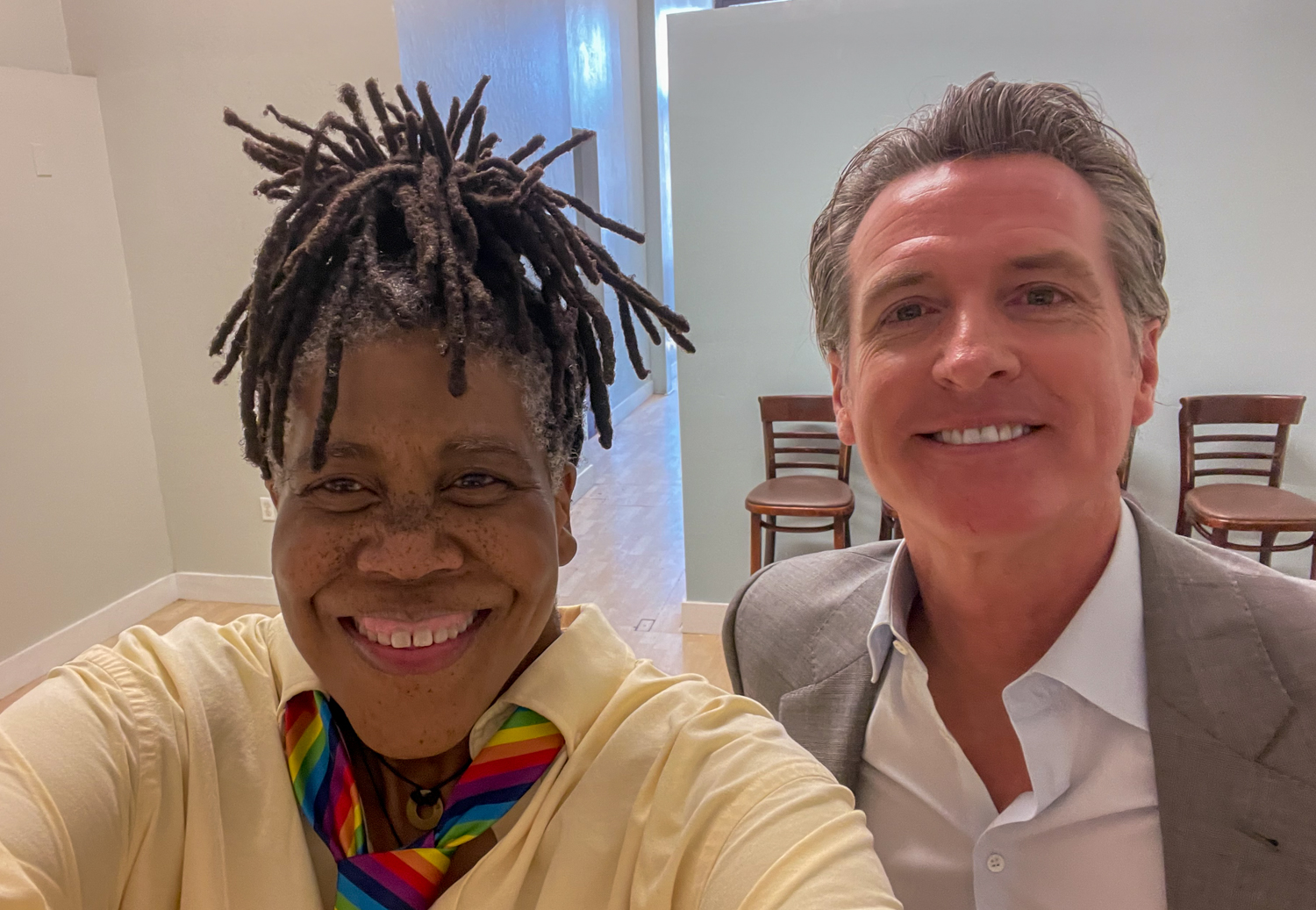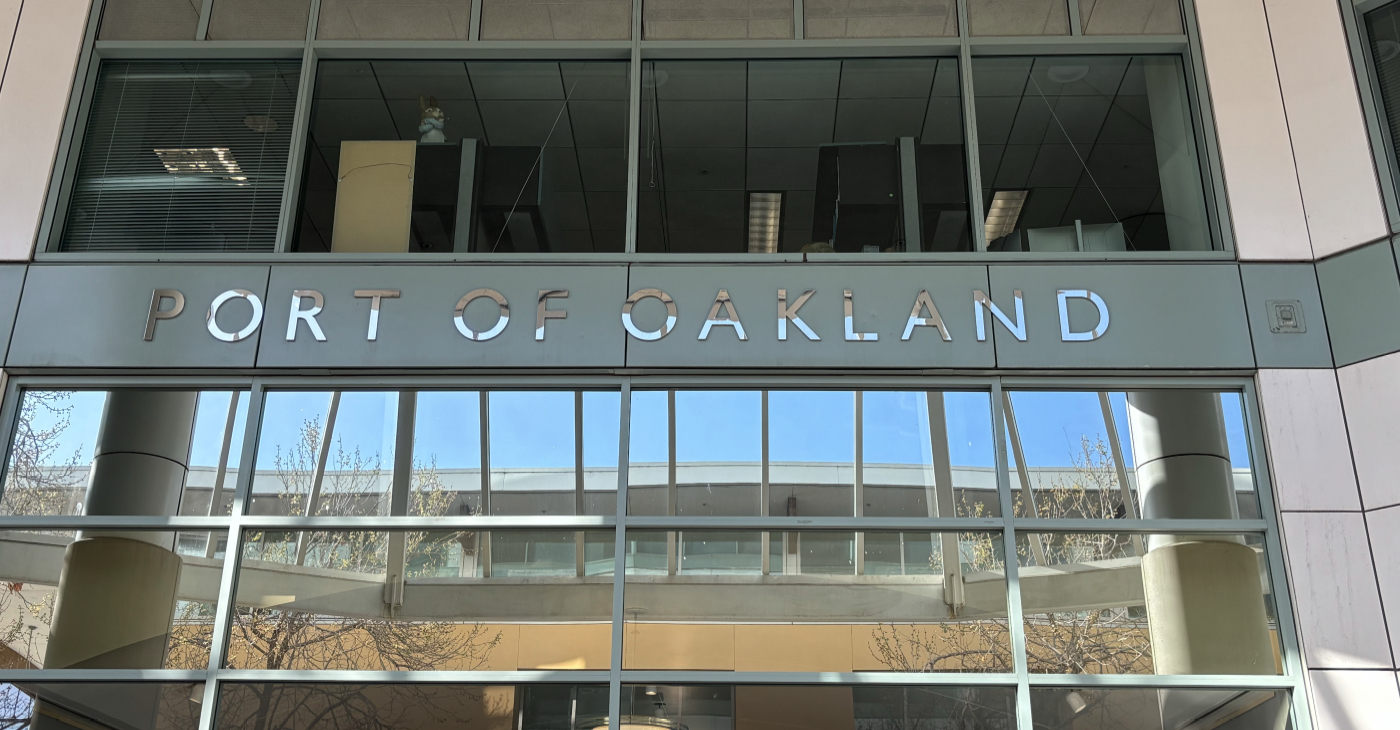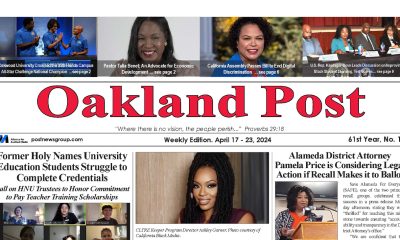Bay Area
Post News Group Exclusive Interview with California Governor Gavin Newsom
Newsom toured Beastmode Barbershop and Graffiti Pizza, both Black-owned businesses and held a press gaggle with the business owners, local politicians and community business leaders.

Editor’s note: This article was edited for brevity and clarity.
On Thursday, June 18, Gov. Gavin Newsom came to Oakland to talk about small businesses and the “largest small business relief program in the nation.” Dubbed California Roars Back, it’s the governor’s $100 billion “comeback plan”.
Newsom toured Beastmode Barbershop and Graffiti Pizza, both Black-owned businesses and held a press gaggle with the business owners, local politicians and community business leaders.
The Post News Group was granted an exclusive one-on-one sit down interview with Newsom.
Post: “Thank you for your time. Why was it important for you to come to Oakland to talk about the comeback plan?”
Newsom: “ Oakland has been described by some of my San Francisco friends as what San Francisco used to be. It’s a compliment(since) many aspects of San Francisco have been lost to sort of a universal same-ism in certain neighborhoods where you see the same eight nine chains, and the neighborhoods begin to lose their sense of community.
“You come to Oakland, and you see this thriving small business network, just remarkable diverse creative artists who happen to be entrepreneurs, literally in some cases, not just figuratively.
“And so for me it’s really .. the manifestation of a vibrant small business community. It’s also a manifestation of what we want to highlight, which is, while the economy in the macro is recovering from a GDP perspective in the aggregate, we don’t live in the aggregate. There are people who have been disproportionately impacted.
“I want to make a point that we have your back, we want to be there for you when the lights turn off (and) the cameras go away. When we turn the page (on the pandemic), we want to make sure we’re there for the medium- and long-term so everyone’s back on their feet.”
Post: “ I heard you speak earlier about not only helping the businesses that have been struggling, but what about the businesses that have gone out of business. What are your plans for them now that we have reopened?”
Newsom: “We’re working on the final proposal of a billion dollars in grants that allow people to utilize the training dollars to make entrepreneurial investments, meaning to actually use the money in a way where they can start up their business again.
“We’re trying to be very creative. . .. I read this case study about a model, … tripartite agreements of labor, business, and the Singapore government, and there’s these portable accounts that they created, tax free accounts that can be used across the spectrum.
“They also have partnerships with business and small business loans and credit enhancements, and people are able to leverage (them) on the basis of their own skills and where they are in terms of their own workforce development.
“We took a version of that idea. And that’s now currently in the final phases of negotiation with the Legislature. In addition, we’re waiving fees for new startups. We are providing opportunities in terms of loans and grants and credits.
“We have a new credit capacity of close to a billion dollars…. We’re doing micro loans, not grants, for those that have no access to credit or traditional banking institutions. We call it the California Dream fund, emphasis on ‘dream,’ because it also doesn’t regard your immigration status.
“We’re writing these micro loans and grants across the spectrum for that subset of our entrepreneur population. We’re trying across all these spectrums to create more support.
“We have all these regional Small Business Centers, 86 of them that are fully staffed, fully functional, more engaged, more dynamic than ever. . . and supporting a lot of the Black chambers.”
Post: “I understand why (you picked) Oakland. Thank you for taking time to speak exclusively with the Black press. But why was that important to you to specifically speak to the Black press and reach out to Black businesses in particular?”
Newsom: “I think, one of the things that kind of ticked me off a little bit – I don’t know if that’s not gubernatorial language, but it’s more personal – I’m sick of the picture that’s painted on some of the networks around the BLM Movement, around the Black community generally, the exploitation, and it doesn’t tell any story. It’s not even interested in telling a story. It connects to manufactured reality.
“And so for me, this is also an opportunity to counter that (artificial) reality and talk about the entrepreneurial spirit. Yes. talk about creativity, talk about just the culture identity and the competency. What makes life worth living is that diversity of expression, output and insight and meeting needs that you didn’t even know existed.
“I think it’s just incredibly important we talk about Black entrepreneurs. Democrats need to do that. I say, I’m a small business guy. We have such a divided country It’s not just do the right thing for Black-owned businesses in Oakland because, you know, we have a disproportionate number of Black-owned businesses in the Bay Area, but it’s also part of a larger national trust.
“I’m just sick and tired of what I’m watching on the national news. And I want to highlight what I think is really one of the most under-expressed and under-communicated stories in America, like innovation, like entrepreneurship.
“Black excellence (exists) across all spectrums, it’s not just about criminal justice reform, it’s not just about police. There are other things we need to include in that conversation without neglecting our responsibilities to solve those issues. “
Post: “And what importance does the Black press have in all that?”
Newsom: “I’ve been so inspired by how Black press perseveres. Talk about resiliency. We have gone to great lengths in the pandemic to support Black press in terms of our COVID efforts, testing efforts or vaccination efforts.
“(We have) partnerships in terms of trusted messengers and outreach. But we can always do more. I know right now, particularly in the Black press, there’s some anxiety that we’re moving from the investments we made in partnership with the federal government, CDC, because of the pandemic. And how are we going to be there now post-pandemic, and so we’re trying to work that through as well.”
Activism
Oakland Post: Week of April 17 – 23, 2024
The printed Weekly Edition of the Oakland Post: Week of April 17 – 23, 2024

To enlarge your view of this issue, use the slider, magnifying glass icon or full page icon in the lower right corner of the browser window. ![]()
Activism
Oakland Schools Honor Fred Korematsu Day of Civil Liberties
Every Jan. 30, OUSD commemorates the legacy of Fred Korematsu, an Oakland native, a Castlemont High School graduate, and a national symbol of resistance, resilience, and justice. His defiant stand against racial injustice and his unwavering commitment to civil rights continue to inspire the local community and the nation. Tuesday was “Fred Korematsu Day of Civil Liberties and the Constitution” in the state of California and a growing number of states across the country.

By Post Staff
Every Jan. 30, OUSD commemorates the legacy of Fred Korematsu, an Oakland native, a Castlemont High School graduate, and a national symbol of resistance, resilience, and justice.
His defiant stand against racial injustice and his unwavering commitment to civil rights continue to inspire the local community and the nation. Tuesday was “Fred Korematsu Day of Civil Liberties and the Constitution” in the state of California and a growing number of states across the country.
One OUSD school is named in his honor: Fred T. Korematsu Discovery Academy (KDA) elementary in East Oakland.
Several years ago, founding KDA Principal Charles Wilson, in a video interview with anti-hate organization “Not In Our Town,” said, “We chose the name Fred Korematsu because we really felt like the attributes that he showed in his work are things that the children need to learn … that common people can stand up and make differences in a large number of people’s lives.”
Fred Korematsu was born in Oakland on Jan. 30, 1919. His parents ran a floral nursery business, and his upbringing in Oakland shaped his worldview. His belief in the importance of standing up for your rights and the rights of others, regardless of race or background, was the foundation for his activism against racial prejudice and for the rights of Japanese Americans during World War II.
At the start of the war, Korematsu was turned away from enlisting in the National Guard and the Coast Guard because of his race. He trained as a welder, working at the docks in Oakland, but was fired after the bombing of Pearl Harbor in 1941. Fear and prejudice led to federal Executive Order 9066, which forced more than 120,000 Japanese Americans out of their homes and neighborhoods and into remote internment camps.
The 23-year-old Korematsu resisted the order. He underwent cosmetic surgery and assumed a false identity, choosing freedom over unjust imprisonment. His later arrest and conviction sparked a legal battle that would challenge the foundation of civil liberties in America.
Korematsu’s fight culminated in the Supreme Court’s initial ruling against him in 1944. He spent years in a Utah internment camp with his family, followed by time living in Salt Lake City where he was dogged by racism.
In 1976, President Gerald Ford overturned Executive Order 9066. Seven years later, the 9th Circuit Court of Appeals in San Francisco vacated Korematsu’s conviction. He said in court, “I would like to see the government admit that they were wrong and do something about it so this will never happen again to any American citizen of any race, creed, or color.”
Korematsu’s dedication and determination established him as a national icon of civil rights and social justice. He advocated for justice with Rosa Parks. In 1998, President Bill Clinton gave him the Presidential Medal of Freedom saying, “In the long history of our country’s constant search for justice, some names of ordinary citizens stand for millions of souls … To that distinguished list, today we add the name of Fred Korematsu.”
After Sept. 11, 2001, Korematsu spoke out against hatred and discrimination, saying what happened to Japanese Americans should not happen to people of Middle Eastern descent.
Korematsu’s roots in Oakland and his education in OUSD are a source of great pride for the city, according to the school district. His most famous quote, which is on the Korematsu elementary school mural, is as relevant now as ever, “If you have the feeling that something is wrong, don’t be afraid to speak up.”
Bay Area
Port of Oakland Commission Votes to Change Oakland Airport to ‘San Francisco Bay Oakland International Airport’
The Port of Oakland Commission voted unanimously to change the name of Metropolitan Oakland International Airport to San Francisco Bay Oakland International Airport at a commission meeting Thursday afternoon. The Port initially announced the name change on March 29, claiming that the change will attract more passengers and enhance the airport’s visibility. They contend that the airport often gets neglected by the public’s lack of knowledge of Oakland’s proximity to San Francisco.

By Magaly Muñoz
The Port of Oakland Commission voted unanimously to change the name of Metropolitan Oakland International Airport to San Francisco Bay Oakland International Airport at a commission meeting Thursday afternoon.
The Port initially announced the name change on March 29, claiming that the change will attract more passengers and enhance the airport’s visibility. They contend that the airport often gets neglected by the public’s lack of knowledge of Oakland’s proximity to San Francisco.
“We want people to know where Oakland is and how beautiful our city is. We want them to visit, we want them to spend their money, and we want to keep our money into our local economy,” Port Commission President Barbara Leslie said at the meeting.
The commissioners shared anecdotal experiences and research to explain how this new name change will elevate and add to the growth of Oakland, not take away from their Bay Area neighbors.
The Port claimed that local residents had been asking for more options in domestic and international flights, but in order to do that, outside travelers need to be aware of Oakland’s presence first.
Since the announcement of the new name, San Francisco leaders strongly opposed the suggestion for a change, the City Attorney going as far as threatening legal action.
SF City Attorney David Chiu announced Monday that his team sent a letter to the Port of Oakland, writing that if Oakland goes forward with the name change, the city will go forward with a lawsuit to prevent the use of their trademarked name.
San Francisco owns U.S. federal trademark registrations for the marks “San Francisco International Airport”, the letter says.
Chiu further claimed that the name change will only cause confusion and chaos for travelers who are used to seeing the San Francisco name in the SFO trademark.
“We want to see the entire Bay Area thrive as a tourist destination and expand our offerings to visitors, but this proposal is not a legal or practical way to go about it. If Oakland moves forward with this proposal, San Francisco will pursue legal action to prevent misuse of our trademark,” Chiu said.
SF Mayor London Breed joined Chiu’s letter, stating that Oakland does not need to add the internationally popular city to its brand in order to grow its services.
“[Oakland] is rich in culture and wonderful people and has its own unique identity. It does not need the name San Francisco as part of its airport to stand out,” Breed wrote.
The Port defended its proposed actions, saying that if the vote did go forward, they would “take all appropriate measures to defend its right to use this accurate geographic identifier.”
“The proposed name modification will clarify, not confuse. The new name identifies where OAK is actually located, which is on the San Francisco Bay,” a spokesperson said on behalf of the Port.
Support for the name change extends beyond the Port. Several regional leaders, airlines and community members have come out in support of the name change, including Oakland Mayor Sheng Thao.
“This adjustment isn’t just about signage—it’s about inviting travelers to discover all that Oakland and the region have to offer. From our local dining scene to unique shopping spots and cozy hotels, there’s something here for everyone. Let’s work together to ensure that Oakland Airport continues to serve as a welcoming gateway for visitors and a source of pride for our community,” Thao said.
Because of public outcry amongst residents and leaders in Oakland and San Francisco before and during the Commission meeting, the Board decided to extend the second reading for the proposed name change from the end of April to the first meeting in May. This decision will allow commissioners to connect with community groups and leaders over their concerns for the change.
The Port Commission is scheduled to hold a second reading of the proposed name change on May 9.
-

 Activism4 weeks ago
Activism4 weeks agoOakland Post: Week of March 20 – 26, 2024
-

 #NNPA BlackPress3 weeks ago
#NNPA BlackPress3 weeks agoCOMMENTARY: D.C. Crime Bill Fails to Address Root Causes of Violence and Incarceration
-

 #NNPA BlackPress3 weeks ago
#NNPA BlackPress3 weeks agoMayor, City Council President React to May 31 Closing of Birmingham-Southern College
-

 #NNPA BlackPress4 weeks ago
#NNPA BlackPress4 weeks agoFrom Raids to Revelations: The Dark Turn in Sean ‘Diddy’ Combs’ Saga
-

 #NNPA BlackPress4 weeks ago
#NNPA BlackPress4 weeks agoCOMMENTARY: Lady Day and The Lights!
-

 Activism3 weeks ago
Activism3 weeks agoOakland Post: Week of March 27 – April 2, 2024
-

 #NNPA BlackPress4 weeks ago
#NNPA BlackPress4 weeks agoBaltimore Key Bridge Catastrophe: A City’s Heartbreak and a Nation’s Alarm
-

 #NNPA BlackPress4 weeks ago
#NNPA BlackPress4 weeks agoBaltimore’s Key Bridge Struck by Ship, Collapses into Water














































